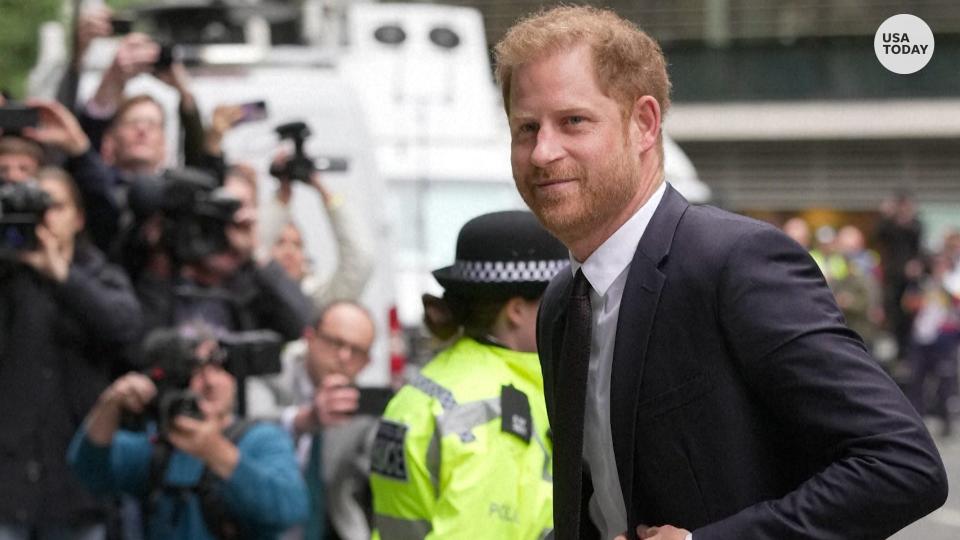Prince Harry to go to trial against another British tabloid for privacy intrusions
LONDON — A London High Court judge on Thursday allowed Prince Harry’s lawsuit against the publisher of The Sun tabloid to go to trial on claims the newspaper used unlawful methods to gather information about him, rejecting the newspaper’s attempt to throw out the case.
The Duke of Sussex alleged the publisher of The Sun and the now-defunct News Of The World had hacked his phone and used investigators and deception to unlawfully gather information on him dating back two decades.
News Group Newspapers, which is owned by Rupert Murdoch, argued that the suit should be thrown because the claims were brought after the six-year limitation to do so expired.

Justice Timothy Fancourt ruled in favor of the argument by the newspapers that Harry was well enough aware of the phone hacking scandal to bring his case sooner. However, he said he would allow him to proceed on claims about other unlawful intrusions, such as the use of private investigators hired to snoop on him.
“There is no evidence currently before me that the duke knew before the (deadline to file a suit) that NGN had done anything other than hack his mobile phone at the News of the World," Fancourt wrote. “Knowing or being on notice of a worthwhile claim for voicemail interception does not of itself amount to knowledge or notice of a worthwhile claim for other forms of UIG.”
A spokesperson for News Group Newspapers called the ruling a “significant victory” that “substantially reduces the scope" of Harry's legal claim.
Britain's phone hacking scandal began at News of the World and was later found to have been widespread at other papers. Murdoch closed News of the World as a result in 2011, issued an unreserved apology in 2012 to those who were hacked and has continued to settle cases related to it. But The Sun has not accepted liability or admitted allegations.
The ruling was similar to one Fancourt made in May in a companion case brought by actor Hugh Grant, that also tossed out phone hacking charges. Harry and Grant’s cases were argued together at an April hearing, and their trial is expected to start in January.
Attorney Michael Gardner, who is not involved in the case, said the judge had thrown out most of Harry’s claims.
“On the face of it, his chances of winning those claims do not look good,” Gardner said. "This is but one of a number of very expensive privacy cases the Duke is currently pursuing in the High Court. If he loses he could be liable for literally millions of pounds in legal costs.”
Harry’s lawyer had argued he was prevented from bringing his case because of a “secret agreement” between the royal family and the newspapers that called for a settlement and apology. The deal, which the prince said was authorized by the late Queen Elizabeth II, would have prevented future litigation from the royals. Harry also said he learned his brother, Prince William, now heir to the throne, had received a “huge” sum to settle his claims.
The publisher denied there was any secret agreement, and Fancourt said Harry failed to produce evidence of such a deal.
Buckingham Palace did not return messages seeking comment on the alleged deal or settlement with the Prince of Wales.
From phone hacking to aerial photos: What to know about all of Prince Harry's lawsuits
Harry had said the rationale for the secret agreement was to avoid putting members of the royal family on the witness stand to recount embarrassing voicemails intercepted by reporters.
The case is one of three phone hacking lawsuits Harry has brought against British tabloid publishers in his battles with the press.
The decision comes less than two months after Harry testified in his lawsuit against the publishers of the Daily Mirror, in which he is seeking 440,000 pounds ($563,000). He became the first senior member of the royal family to testify in a court in more than a century.
Prince Harry, Duchess Meghan say they were in 'near catastrophic' car chase with paparazzi
This article originally appeared on USA TODAY: Prince Harry granted trial against The Sun over privacy intrusions
